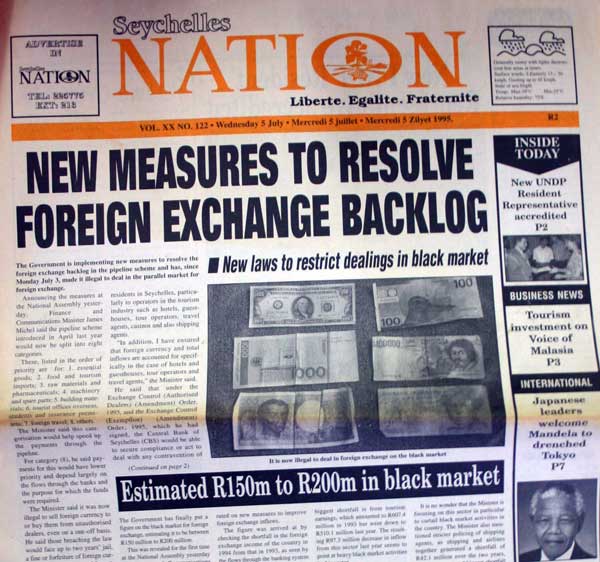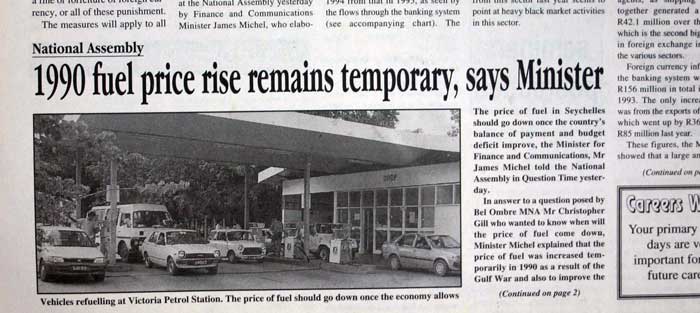



Over twelve years ago the following articles appeared on the front page of the Seychelles Nation - Wednesday 5th July, 1995, exactly twelve years, four months and twenty days ago. The article dealt primarily with two main issues which are still with us twelve years later; black market and the price of fuel. Remarkably, the situation now is no different from what it was all these years ago; a clear sign, if one was ever needed, that SPPF is failing the people on a massive scale. It is clear that SPPF policies are not working one iota. All indications are that the SPPF government cannot and will never be able to get us out of the mess they themselves are responsible for creating in the country.
There is no end in sight for the black market. Despite the laws to restrict dealings in black market enacted all these years ago, the black market is still here, vibrant and plugging a hole the commercial banks obviously cannot fill. It is still around and growing stronger by the day with the devaluation of the
The price of fuel is still rising and has never fallen despite promises by President Michel, then Minister of Finance, that it would be reduced significantly in July, 1995. We reproduce below the articles for your own judgment and conclusions. Really we are going nowhere with the SPPF, we need a change now!
The Government has finally put a figure on the black market for foreign exchange, estimating it to be between R150 million to R200 million.
This was revealed for the first time at the National Assembly yesterday by Finance and Communications Minister James Michel, who elaborated on new measures to improve foreign exchange inflows.
The figure was arrived at by checking the shortfall in the foreign exchange income of the country in 1994 from that in 1993, as seen by the flows through the banking system (see accompanying chart. The biggest shortfall is from tourism earnings, which amounted to R606.4 million in 1993 but went down to R510.1 million last year. The resulting R97.3 million decreases in inflow from this sector last year seems to point at heavy black market activities in this sector.
It is in no wonder that the Minister is focusing on this sector in particular to curtail black market activities in the country. The Minister also mentioned stricter policing of shipping agents, as shipping and airlines together generated a shortfall of R42.1 million over the two years, which is the second biggest shortfall in foreign exchange inflow among the various sectors.
Foreign currency inflows through the banking system went down by R156 million in total in 1994 from 1991. The only increase recorded was from the exports of canned tuna, which went up by R36.5 million to R85 million last year.
Theses figures, the Minister said, showed that a large amount of foreign currency was being traded outside of the banking system. He said because of this, the backlog in the pipeline scheme, which at the end of June stood at R274 million, was increasing.
The Minister explained that the backlog contained requests for future payments, and it was estimated that the backlog was actually less than the total amount that was currently traded on the black market.
“It can be concluded that if the black market did not exist, it is likely that the pipeline will dismantle itself,” he pointed out.
Editor’s comment: The scenario as described above has gotten worse in the fifteen years since it appeared in the
The Government is implementing new measures to resolve the foreign exchange backlog in the pipeline scheme and has, since Monday July 3rd; make it illegal to deal in the parallel market for foreign exchange.
Announcing the measures at the National Assembly yesterday, Finance and Communications Minister James Michel said the pipeline scheme introduced in April last year would now be split into eight categories.
These, listed in the order of priority are for: 1. essential goods; 2. food and tourism imports; 3. raw materials and pharmaceuticals; 4. machinery and spare parts; 5. building materials; 6. tourists offices overseas, students and insurance premiums; 7. foreign travel; 8. others.
The Minister said this categorisation would help speed up the payments through the pipeline.
For category (8), he said payments for this depend largely on the flows through the banks and the purpose for which the funds were required.
The Minister said it was now illegal to sell foreign currency to or buy them from unauthorised dealers, even on a one-off basis. He said those breaching the law would face up to two years’ in jail, a fine or forfeiture of foreign currency, or all of these punishment.
The measures will apply to all residents in
“In addition, I have ensured that foreign currency and total inflows are accounted for specifically in the case of hotels and guesthouses, tour operators and travel agents,” the Minister said.
He said that under the Exchange Control (Authorised Dealers) (Amendment) Order, 1995, which he had signed, the Central Bank of Seychelles (CBS) would be able to secure compliance or act to deal with any contravention of the law.
He added that there would be inspections by CBS and Seychelles Licensing Authority (SLA) officials on businesses specified in the order.
Minister Michel said it was his view that measures will provide the means to minimise and eventually eliminate the black market altogether, with the cooperation of all specified businesses and all Seychellois in general.
The price of fuel in Seychelles should go down once the country’s balance of payment and budget deficit improve, the Minister for Finance and Communications, Mr. James Michel told the National Assembly in Question Time yesterday.
In answer to a question posed by Bel Ombre MNA Mr. Christopher Gill who wanted to know when the price of fuel will come down, Minister Michel explained that the price of fuel was increased temporarily in 1990 as a result of the Gulf War and also to improve the balance of payment and reduce foreign exchange spending.
Although the price of fuel on the international market went down after the war, it was not reduced in
He explained that the increase still remained temporary and the country’s balance of payment and budget deficit was being closely monitored so as to review the price of fuel as soon as the economy allows.
Apart from helping to reduce the budget deficit, the revenue generated also helped retire public debt and improve the life of the population as a whole through the complete removal of trades tax on essential commodities and reducing considerably that on others.
Minister Michel explained that the benefits to the population had been very positive over the past years as the Government had been able to continuously reduce tax on imported commodities.
To date, Minister Michel said, trades tax had been abolished on 13 basic essential commodities which used to be in the trades tax band of 5% to 56%. He also gave a list of other examples where trades tax had been reduced significantly, among them 12 which used to carry trades tax rates of 15% to 55% now had been reduced to 5% and 22 in the trades tax band of 17% to 125% were now only 15%.
The trades tax on fuel, Minister Michel said, stood at R5 per litre on petrol, R3.25 for diesel and R1.20 for kerosene.
This brought the Government revenue of R145 million in 1994 compared to R111 million in 1990.
Editor’s comment: Despite the above promises, the price of fuel was never revised until very recently, when it went up again, not go down as promised; an increase of 100%. It goes to show that this government cannot be trusted at all. They say one thing and do the complete opposite. This simply means that the SPPF government has been “LYING” to the people way back in 1995 and keeps doing so with impunity even today. The fact that the price of fuel in Seychelles has never gone down is proof that the country’s balance of payment and budget deficit has remained constantly and permanently in the red in the last fifteen years since this article appeared in the Seychelles Nation. Plus ça change!